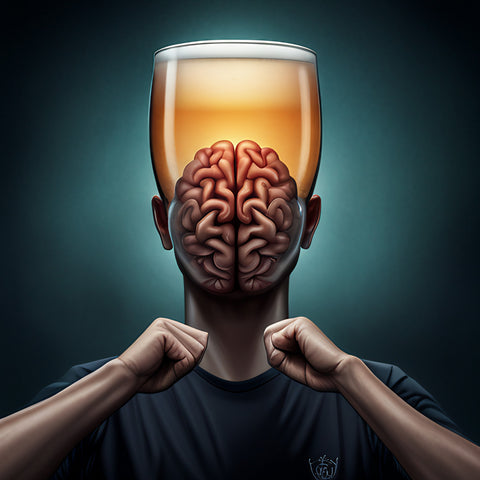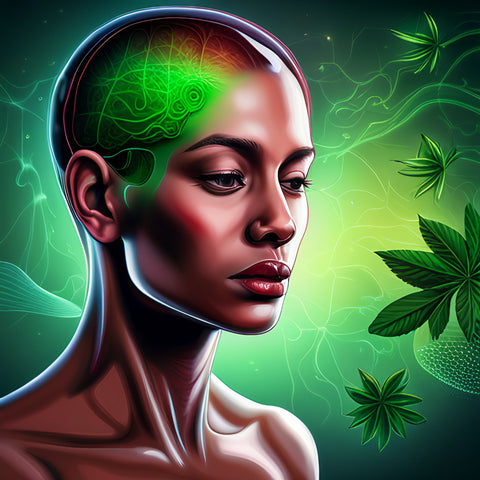Alcohol is commonly consumed to relax and unwind after a long day. While drinking in moderation may not cause harm, excessive alcohol consumption can lead to mental and physical health issues. One of the ways alcohol can harm the body is by affecting levels of brain-derived neurotrophic factor (BDNF). BDNF is a protein that plays a crucial role in preserving and promoting the growth of neurons in the brain. In this blog, we will explore the potential effects of alcohol on BDNF levels, the potential implications it has on mental and physical health, and the risks associated with excessive alcohol consumption. Additionally, we will discuss how a coffee fruit extract and micro-dosed THC coffee may counter the risks of alcohol consumption.
BDNF plays a vital role in the maintenance of neurons, which help support brain functions such as memory, learning, and cognition. Studies have shown that alcohol disrupts the production and release of BDNF, particularly in the hippocampus, a region of the brain that is associated with learning and memory. When levels of BDNF are low, it can lead to cognitive impairment and an increased risk of developing mental health conditions such as depression and anxiety. Furthermore, low levels of BDNF have also been linked with the development of physical health issues such as obesity and diabetes.
Excessive alcohol consumption can lead to a range of health issues, including liver damage, pancreatitis, and heart disease. Studies have also linked alcohol use with an increased risk of developing cancers such as breast, liver, and colon cancer. The effects of alcohol on the brain can be equally detrimental, with alcohol abuse contributing to the development of mental health conditions such as depression, anxiety, and psychosis. Alcohol can worsen the symptoms of these conditions by disrupting the production and release of BDNF, leading to a decrease in overall brain function.
However, there are ways to counteract the negative effects of alcohol on BDNF levels and the body. One such method is by consuming a coffee fruit extract, also known as the fruit of the coffee plant. The extract contains high levels of antioxidants and polyphenols, which are known to counteract the negative effects of oxidative stress and inflammation, two factors that contribute to the decrease in BDNF levels caused by alcohol consumption. Studies have shown that the consumption of specific polyphenols found in coffee fruit extract can increase BDNF levels in the brain, when taken in certain concentrations and doses, leading to a reduction in cognitive decline and an improvement in overall brain function.
Another option that may counter the risks associated with alcohol consumption is by consuming micro-dosed THC coffee. THC, or tetrahydrocannabinol, is the psychoactive compound found in hemp and cannabis. The consumption of micro-dosed THC coffee can promote the growth of neurons in the brain by stimulating the production of BDNF. Studies have found that low doses of THC can lead to an increase in BDNF levels, leading to an improvement in overall brain function and reducing the risk of developing mental health conditions.
Conclusion:
Alcohol consumption can have significant effects on the brain and body, leading to a range of health implications. The decrease in BDNF levels caused by alcohol consumption can contribute to cognitive decline, mental health conditions, and physical health issues. Consuming a coffee fruit extract and micro-dosed THC coffee may counteract the negative effects of alcohol on the body, promoting the growth of neurons in the brain and protecting overall brain function. It is essential to consume alcohol in moderation and explore alternative methods of relaxation and unwinding, such as incorporating the consumption of a coffee fruit extract and micro-dosed THC coffee. Remember to prioritize your health and well-being while enjoying life!
References:
Pascual, M., & Blanco, A. M. (2011). BDNF and alcohol: A comprehensive review. Pharmacology Biochemistry and Behavior, 100(1), 20–30. doi: 10.1016/j.pbb.2011.07.003
Aguiar Jr, A.S., et al. (2013). Short-term anxiolytic-like effects of coffee components in pentylenetetrazole-induced seizures in zebrafish: Involvement of Adenosine and GABA Receptors. Journal of Agricultural and Food Chemistry, 61: 7999–8008.
Lucassen, P. J., et al. (2010). Regulation of adult neurogenesis by stress, sleep disruption, exercise and inflammation: Implications for depression and antidepressant action. European Neuropsychopharmacology, 20(8), 1-17.
Lippert, T. L., et al. (2009). Alcohol‐induced alterations in rodent behavior: involvement of brain‐derived neurotrophic factor. Alcoholism: Clinical and Experimental Research, 33(8), 1694-1707.
Wu, T. X., et al. (2016). Antioxidant and Anti-Inflammatory Activities of Anthocyanins and Their Cytotoxicity. Biomed Research International, 2016, 1-10.






